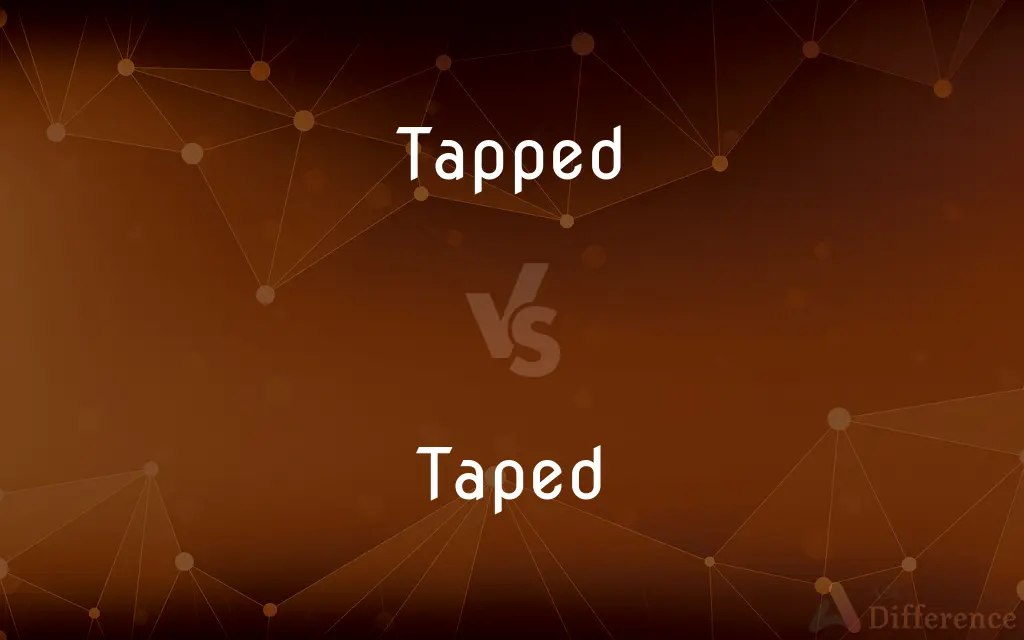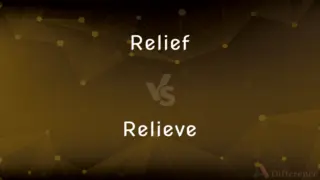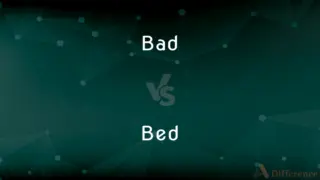Tapped vs. Taped — What's the Difference?
By Tayyaba Rehman — Updated on June 5, 2024
Tapped refers to lightly striking something or drawing out fluid, while taped means sticking or binding with adhesive tape.

Difference Between Tapped and Taped
Table of Contents
ADVERTISEMENT
Key Differences
Tapped usually means to draw liquid from a large container (like tapping a keg) or to gently strike something. For example, tapping a phone line refers to secretly listening to conversations. Tapped can also mean selecting someone for a position or duty. Taped refers to the use of adhesive tape to stick things together or to record sound or video. When something is taped, it could be physically bound with tape, or an event could be recorded on a tape. Taped has a very tangible aspect to it, either involving a physical object (like tape) or the act of recording.
In terms of action, when something is tapped, it is usually a light, quick action, possibly repeated. Tapped can also imply accessing resources or information. Taping, on the other hand, involves attaching, securing, or recording with tape. Taping is deliberate, securing one thing to another or capturing an event for future replay.
Tapped implies a temporary or gentle action, such as tapping a finger on a table. Taped implies a more permanent or securing action, such as taping a box shut. Tapped is often used in metaphorical senses, such as tapping into one's potential, while taped is usually quite literal.
Tapped can carry the sense of potential, as in tapping into resources or ideas. Taped usually signifies completion or preservation, like taping a document to a wall or taping a television show to watch later. Each word suggests a different kind of interaction with the object or subject at hand.
Comparison Chart
Meaning
To strike lightly or extract liquid
To secure or record with adhesive tape
ADVERTISEMENT
Usage
Often used metaphorically or physically
Primarily used in physical context
Action
Gentle, quick, or symbolic
Binding, securing, or recording
Context
Can be abstract (e.g., tapping resources)
Typically concrete (e.g., taping a box)
Part of Speech
Used as a verb
Used as a verb or adjective (when past participle)
Compare with Definitions
Tapped
To use a resource or source of information.
The team tapped into the alumni network for fundraising.
Taped
To attach or seal with adhesive tape.
He taped the package before shipping.
Tapped
To strike gently with a light blow or blows
I tapped you on the shoulder to get your attention.
Taped
To record audio or video onto magnetic tape or other recording medium.
They taped the concert for a live album.
Tapped
To give a light rap with
Tap a pencil.
Taped
To affix something flat against a surface using tape.
Posters were taped to the wall for the event.
Tapped
To produce with a succession of light blows
Tap out a rhythm.
Taped
To bind parts together using tape.
She taped her finger to the splint for support.
Tapped
To select, as for membership in an organization; designate.
Taped
A continuous narrow, flexible strip of cloth, metal, paper, or plastic, such as adhesive tape, magnetic tape, or ticker tape.
Tapped
To repair (shoe heels or toes) by applying a thin layer of leather or a substitute material.
Taped
To cover an area to restrict access or activity.
The area was taped off by police for investigation.
Tapped
To attach metal plates to (shoe toes or heels).
Taped
A narrow strip of strong woven fabric, as that used in sewing or bookbinding.
Tapped
To deliver a gentle, light blow or blows.
Taped
A string stretched across the finish line of a racetrack to be broken by the winner.
Tapped
To walk making light clicks.
Taped
A length, reel, or cassette of magnetic tape.
Tapped
To tap-dance.
Taped
A recording made on magnetic tape.
Tapped
To furnish with a spigot or tap.
Taped
A tape measure.
Tapped
To pierce in order to draw off liquid
Tap a maple tree.
Taped
To fasten, secure, strengthen, or wrap with a tape
Taped the box so that it wouldn't fall apart.
Tapped
To draw (liquid) from a vessel or container
Tap a new keg of beer.
Taped
To record (sounds or pictures) on magnetic tape or other electronic storage medium
The reporter taped the interview.
Tapped
(Medicine) To withdraw fluid from (a body cavity).
Taped
To measure with a tape measure.
Tapped
To make a physical connection with or open outlets from
Tap a water main.
Taped
To make a recording on magnetic tape or other electronic storage medium.
Tapped
To wiretap (a telephone or communications channel).
Taped
Simple past tense and past participle of tape
Tapped
To establish an electric connection in (a power line), as to divert current secretly.
Taped
Secured or held in place by tape;
Carefully taped pieces of glass served as a windowpane
Tapped
To establish access to or a connection with
Tapped a new market for inexpensive books.
Taped
Recorded on tape
Tapped
To take advantage of; make use of
Tapped voter anger to win the election.
Tapped
To cut screw threads in (a collar, socket, or other fitting).
Tapped
(Informal) To ask (a person) for money.
Tapped
A gentle blow.
Tapped
The sound made by such a blow.
Tapped
A thin layer of leather or a substitute applied to a worn-down shoe heel or toe.
Tapped
A metal plate attached to the toe or heel of a shoe, as for tap-dancing.
Tapped
Tap dance.
Tapped
(Linguistics) See flap.
Tapped
A valve and spout used to regulate delivery of a fluid at the end of a pipe.
Tapped
A plug for a bunghole; a spigot.
Tapped
Liquor drawn from a spigot.
Tapped
Liquor of a particular brew, cask, or quality.
Tapped
(Medicine) The removal of fluid from a body cavity
A spinal tap.
Tapped
A tool for cutting an internal screw thread.
Tapped
A makeshift terminal in an electric circuit.
Tapped
A wiretap.
Tapped
Simple past tense and past participle of tap
Tapped
Having a tap or taps.
A tapped keg; a tapped maple tree
Tapped
Of a card or playing piece: used up for the current turn.
Tapped
(slang) Crazy, eccentric.
Tapped
In a condition for letting out liquid drawn out as by piercing or drawing a plug;
Latex from tapped rubber trees
Tapped
To draw liquid, especially from a barrel or cask.
The bartender tapped a new keg for the party.
Tapped
To select or appoint someone for a task or honor.
She was tapped to lead the new project at work.
Tapped
To strike something gently, often to get attention.
He tapped on the window to signal his arrival.
Tapped
To establish an electronic connection, especially for surveillance.
The agency tapped the suspect's phone calls.
Common Curiosities
Is "tapped" only used in present tense?
No, it can be used in any tense, depending on the context.
Can "taped" be a noun?
No, "taped" is a verb or an adjective, but "tape" can be a noun.
Is "tapped" always related to liquids?
No, "tapped" can also refer to selecting someone or accessing resources.
Can "taped" refer to any kind of tape?
Yes, "taped" can refer to the use of any adhesive tape.
Does "tapped" imply a soft or hard touch?
"Tapped" usually implies a soft, light touch.
Can "taped" be used in medical contexts?
Yes, such as when referring to taping a joint for support.
Can "taped" refer to repairing something?
Yes, taping can be a temporary fix or repair for some objects.
Are "tapped" and "taped" interchangeable?
No, they have different meanings and are used in different contexts.
Can "taped" mean to record electronically without physical tape?
Yes, it's used to mean recording even in digital formats.
Is "tapped" a passive action?
"Tapped" can be active or passive, depending on how it's used.
Does "tapped" ever mean to draw upon mentally?
Yes, as in tapping into one's inner thoughts or potential.
Is "tapped" related to music?
It can be, as in tapping one's foot to the rhythm.
Is "tapped" used in technology?
Yes, "tapped" can refer to wiretapping or accessing tech resources.
Can "taped" be past tense?
Yes, it can be used to describe an action completed in the past.
Is "taped" used in sports?
Yes, athletes often tape their equipment or body parts for support.
Share Your Discovery

Previous Comparison
Relief vs. Relieve
Next Comparison
Bad vs. BedAuthor Spotlight
Written by
Tayyaba RehmanTayyaba Rehman is a distinguished writer, currently serving as a primary contributor to askdifference.com. As a researcher in semantics and etymology, Tayyaba's passion for the complexity of languages and their distinctions has found a perfect home on the platform. Tayyaba delves into the intricacies of language, distinguishing between commonly confused words and phrases, thereby providing clarity for readers worldwide.













































